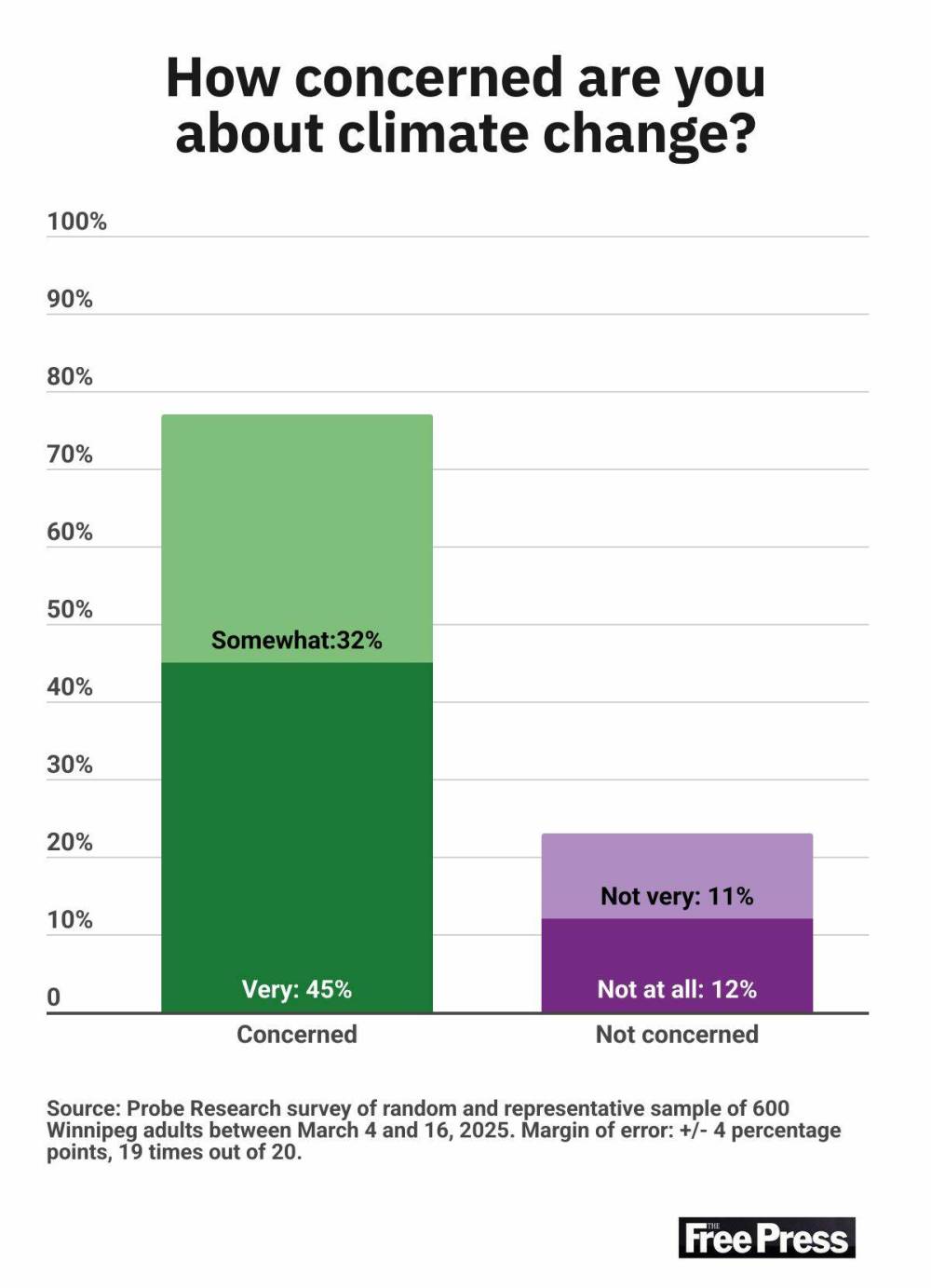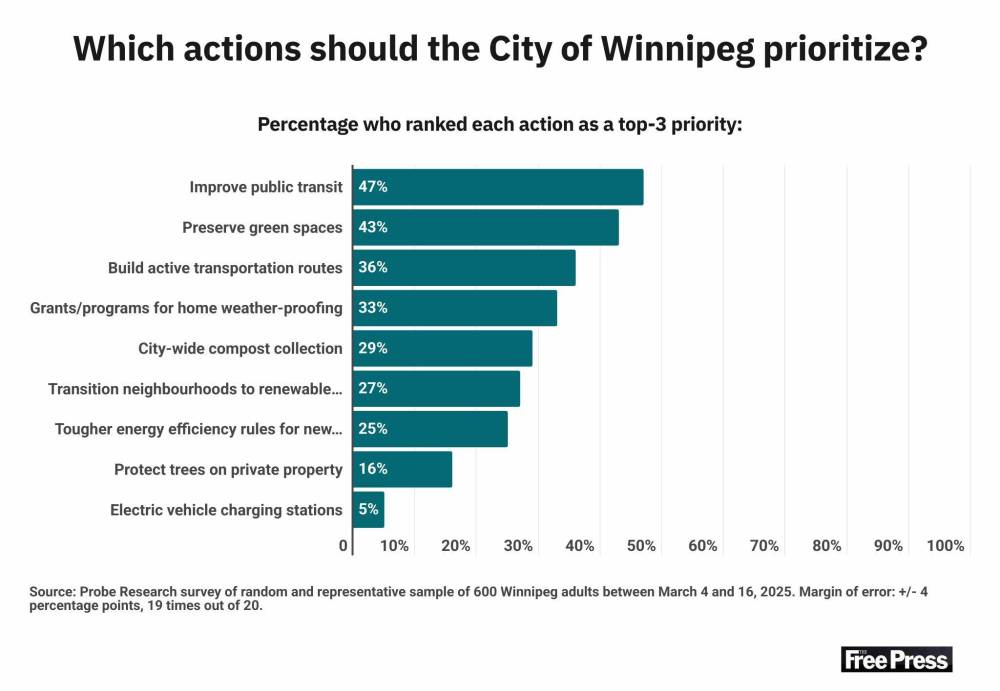Winnipeggers concerned about climate change, split on its importance: poll
Advertisement
Read this article for free:
or
Already have an account? Log in here »
To continue reading, please subscribe:
Monthly Digital Subscription
$0 for the first 4 weeks*
- Enjoy unlimited reading on winnipegfreepress.com
- Read the E-Edition, our digital replica newspaper
- Access News Break, our award-winning app
- Play interactive puzzles
*No charge for 4 weeks then price increases to the regular rate of $19.00 plus GST every four weeks. Offer available to new and qualified returning subscribers only. Cancel any time.
Monthly Digital Subscription
$4.75/week*
- Enjoy unlimited reading on winnipegfreepress.com
- Read the E-Edition, our digital replica newspaper
- Access News Break, our award-winning app
- Play interactive puzzles
*Billed as $19 plus GST every four weeks. Cancel any time.
To continue reading, please subscribe:
Add Free Press access to your Brandon Sun subscription for only an additional
$1 for the first 4 weeks*
*Your next subscription payment will increase by $1.00 and you will be charged $16.99 plus GST for four weeks. After four weeks, your payment will increase to $23.99 plus GST every four weeks.
Read unlimited articles for free today:
or
Already have an account? Log in here »
Hey there, time traveller!
This article was published 16/04/2025 (203 days ago), so information in it may no longer be current.
It’s clear Winnipeggers care about climate change, but a new poll suggests residents are foggy on what the city is doing about it.
Last month, city council’s climate action and resilience committee commissioned Probe Research to survey residents about the city’s efforts to address climate change. Despite finding widespread concern about climate impacts on infrastructure, health and housing, the survey found most are unfamiliar with — and ambivalent about — the city’s climate action policies.
Coun. Brian Mayes, who chairs the committee, said the first-of-its-kind survey is designed to help council understand Winnipeggers’ climate action priorities and influence policy decisions.

“It’s quite useful in that context and alters my thinking about a couple of things,” Mayes (St. Vital) said in an interview Wednesday.
For example, the poll found residents want to preserve parks and green spaces, but aren’t as keen on bylaws to protect trees on private property — something council has pursued in the past. There’s also less interest in alternatives to natural gas for heating, Mayes was surprised to find, despite more than a quarter of residents indicating they’ve struggled to afford heating and cooling during extreme weather events.
Less surprising, however: more than three-quarters of Winnipeggers are concerned about climate change.
Seven in 10 respondents worried about the impacts of climate change on the city’s roads, green spaces, sewage infrastructure and ability to respond to extreme weather emergencies. The same proportion agreed councillors should factor climate change into all decisions and that the city should be doing more to address pollution.
Nearly half of respondents indicated climate change has put the people and places they love at risk and the same proportion agreed it has negatively impacted their physical or mental health.
That echoes what councillors are seeing on the ground. Speaking to the Free Press last week about her decision to sign an open letter urging federal leaders to take action on climate change, Fort Rouge-East Fort Garry Coun. Sherri Rollins said she’s noticed “a really engaged climate community in Winnipeg.
“Whether it’s food security… or the climate justice organizations in every nook and cranny. We have a very active and leading green sector, we have incredible businesses that do green infrastructure,” she said.
Mayes agreed the data “reflects a broad philosophical change” he’s noticed since he was first elected in 2011. Citywide composting, for example, was hardly a topic of conversation then, but now ranks as top-three priority for nearly 30 per cent of survey respondents.
Asked where climate change measures up compared to “all the issues facing Winnipeg,” a little more than a third called it a high priority, while a similar proportion ranked it a low priority. Notably, 30 per cent of respondents agreed with the statement “climate change is nowhere close to the crisis some say it is.”
Almost 70 per cent said they were neither satisfied nor dissatisfied with Winnipeg’s efforts thus far and eight in 10 residents were unfamiliar with the city’s climate actions.

Mayes said Winnipeggers want cost-effective changes they can see right away but climate policy tends to be expensive and slow moving.
“I think people get that there’s climate issues but they’re also concerned about affordability and making sure their money isn’t being wasted,” Mayes said.
The survey said residents are most likely to support improved public transit, active transportation options and preserving green spaces. Mayes said efforts to support parks, trees and green infrastructure could be easy wins. The survey will be presented to the climate action and resilience committee next week before making its way up the committee chain and into council chambers, where Mayes hopes it will garner debate, attention — and some urgency.
“We have all of these grandiose plans and targets and visions and strategies,” he said, referencing Winnipeg’s 2018 climate action plan and the community energy investment road map adopted last year. “Let’s concentrate on some actions.”
Probe surveyed 600 Winnipeg residents between March 4-16, both online and over the phone. The results are considered accurate plus or minus four per cent 95 per cent of the time.
julia-simone.rutgers@freepress.mb.ca

Julia-Simone Rutgers is the Manitoba environment reporter for the Free Press and The Narwhal. She joined the Free Press in 2020, after completing a journalism degree at the University of King’s College in Halifax, and took on the environment beat in 2022. Read more about Julia-Simone.
Julia-Simone’s role is part of a partnership with The Narwhal, funded by the Winnipeg Foundation. Every piece of reporting Julia-Simone produces is reviewed by an editing team before it is posted online or published in print — part of the Free Press‘s tradition, since 1872, of producing reliable independent journalism. Read more about Free Press’s history and mandate, and learn how our newsroom operates.
Our newsroom depends on a growing audience of readers to power our journalism. If you are not a paid reader, please consider becoming a subscriber.
Our newsroom depends on its audience of readers to power our journalism. Thank you for your support.






